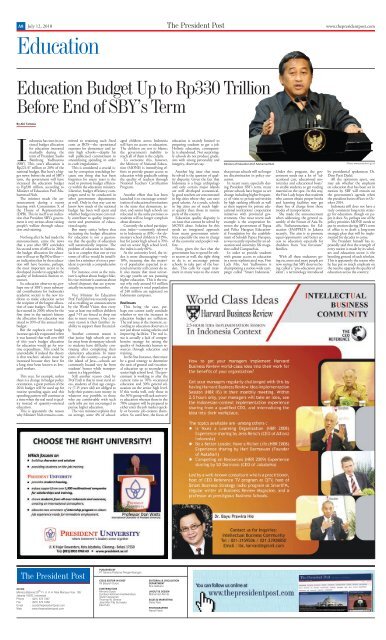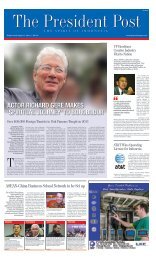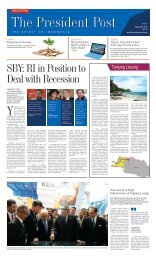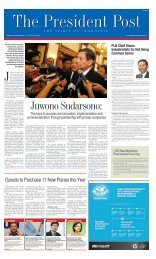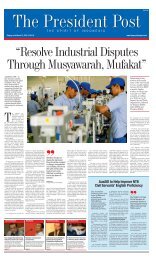Mari Pangestu: The Champion of Free Trade - The President Post
Mari Pangestu: The Champion of Free Trade - The President Post
Mari Pangestu: The Champion of Free Trade - The President Post
Create successful ePaper yourself
Turn your PDF publications into a flip-book with our unique Google optimized e-Paper software.
A8<br />
July 12, 2010<br />
<strong>The</strong> <strong>President</strong> <strong>Post</strong><br />
www.thepresidentpost.com<br />
Education<br />
Education Budget Up to Rp330 Trillion<br />
Before End <strong>of</strong> SBY’s Term<br />
By Alci Tamesa<br />
Indonesia has seen its national<br />
budget allocation<br />
for education increased<br />
markedly during the<br />
term <strong>of</strong> <strong>President</strong> Susilo<br />
Bambang Yudhoyono<br />
(SBY). This year’s allocation is<br />
Rp221.47 trillion or 20% <strong>of</strong> the<br />
national budget. But here’s a bigger<br />
news: before the end <strong>of</strong> SBY’s<br />
term, the government will have<br />
increased the education budget<br />
to Rp330 trillion, according to<br />
Minister <strong>of</strong> Education Pr<strong>of</strong>. Muhammad<br />
Nuh.<br />
<strong>The</strong> minister made the announcement<br />
during a recent<br />
hearing with Commission X <strong>of</strong><br />
the House <strong>of</strong> Representatives<br />
(DPR). This in itself is an indication<br />
that <strong>President</strong> SBY’s government<br />
is very serious about raising<br />
people’s welfare through education<br />
and training.<br />
Not long after he had made the<br />
announcement, came the news<br />
that a year after SBY concludes<br />
his second term <strong>of</strong> <strong>of</strong>fice in 2014,<br />
the budget allocation for education<br />
will soar to Rp350 trillion—<br />
an indication that by then education<br />
will have become, perhaps,<br />
the most important sector to be<br />
developed in order to upgrade the<br />
quality <strong>of</strong> Indonesia’s human resources.<br />
So, education observes say, perhaps<br />
one <strong>of</strong> SBY’s most substantial<br />
contributions for Indonesia’s<br />
academic society is the new tradition<br />
to make education sector<br />
the recipient <strong>of</strong> the largest allocation<br />
<strong>of</strong> state budget. This had in<br />
fact started in 2009, when for the<br />
first time in the nation’s history<br />
the allocation for education was<br />
raised to 20% <strong>of</strong> the annual state<br />
budget.<br />
But the euphoria over budget<br />
increase quickly evaporated when<br />
it was learned that well over 60$<br />
<strong>of</strong> this year’s budget allocation<br />
for education would go for routine<br />
expenditure. This could be<br />
unavoidable if indeed the theory<br />
is that teachers’ salaries must be<br />
increased because they have for<br />
a long time been known as lowpaid<br />
workers.<br />
This year, for example, unless<br />
there is a change in budget policy<br />
orientation, a great portion <strong>of</strong> the<br />
2014 budget will be used up for<br />
routine spending again and this<br />
spending pattern will continue at<br />
a time when the real need is quality<br />
instead <strong>of</strong> quantity-oriented<br />
education.<br />
This is apparently the reason<br />
why Minister Nuh remains com-<br />
mitted to retaining such fixed<br />
costs as BOS—the operational<br />
expenses for elementary and junior<br />
high schools—despite his<br />
well publicized commitment to<br />
streamlining spending in order<br />
to curb irregularities.<br />
This is considered a crucial issue<br />
by corruption watchdogs because<br />
one thing that has been<br />
forgotten for many years is the<br />
need to promote budget efficiency<br />
within the education ministry.<br />
Likewise, budget efficiency campaigns<br />
need to be conducted in<br />
other government departments<br />
as well. Only in that way can we<br />
know how much <strong>of</strong> the national<br />
budget has been well spent and<br />
whether budget increase can really<br />
contribute to quality improvement<br />
and promotion <strong>of</strong> educational<br />
equity.<br />
But many critics believe that<br />
increasing the budget allocation<br />
for education is not a guarantee<br />
that the quality <strong>of</strong> education<br />
will automatically improve. <strong>The</strong><br />
problem <strong>of</strong> education in Indonesia<br />
is so complex that one or two<br />
terms <strong>of</strong> <strong>of</strong>fice would be insufficient<br />
for a minister <strong>of</strong> even a president<br />
to provide a comprehensive<br />
remedy.<br />
For instance, even as the minister<br />
is upbeat about budget hike,<br />
his vice minister is cautious about<br />
school dropouts that are systematically<br />
increasing in number.<br />
Vice Minister for Education<br />
Pr<strong>of</strong>. Fasli Jalal was recently quoted<br />
as recalling an announcement<br />
by the World Vision that every<br />
year at least one million children<br />
aged 7-15 are forced to drop out<br />
due to many reasons. One common<br />
reason is their families’ inability<br />
to support them financially.<br />
Another common reason is<br />
that junior high schools are too<br />
far away from elementary schools<br />
so students have difficulty continuing<br />
after completing their<br />
elementary education. In many<br />
parts <strong>of</strong> the country—except on<br />
the island <strong>of</strong> Java—schools are<br />
commonly located very far from<br />
students’ homes while transportation<br />
is a big problem.<br />
Still another reason cited by<br />
Pr<strong>of</strong> Fasli is that in most rural areas,<br />
students <strong>of</strong> that age category<br />
(7-15 years old) are obliged to<br />
help their parents earn money in<br />
whatever way possible, so those<br />
who are comfortable with such<br />
early jobs are not encouraged to<br />
pursue higher education.<br />
<strong>The</strong> vice minister explains that<br />
on average, some 4% <strong>of</strong> schoolaged<br />
children across Indonesia<br />
still have no access to education.<br />
<strong>The</strong> children are not to blame;<br />
the government’s inability to<br />
reach all <strong>of</strong> them is the culprit.<br />
To overcome this, however,<br />
the Ministry <strong>of</strong> National Education<br />
(MONE) is intensifying efforts<br />
to provide greater access to<br />
education while gradually raising<br />
the quality <strong>of</strong> teachers through<br />
National Teachers’ Certification<br />
Program.<br />
Another effort that has been<br />
launched is to encourage centralization<br />
<strong>of</strong> educational institutions<br />
in the sense that elementary, junior,<br />
and senior high schools are<br />
relocated in the same premises so<br />
students will no longer complain<br />
about distance.<br />
Currently the school participation<br />
index—commonly referred<br />
to in Indonesia as APK—for elementary<br />
school children is 115%,<br />
but for junior high school is 70%<br />
and on senior high school level,<br />
the index is only 60%.<br />
At the university level, the index<br />
is more discouraging—only<br />
18%, meaning that the majority<br />
<strong>of</strong> population expected to attend<br />
university still cannot do so.<br />
It also means that most university-age<br />
youths are not pursuing<br />
higher education. This is the reason<br />
why only around 4.5 million<br />
<strong>of</strong> the country’s total population<br />
<strong>of</strong> 240 million are registered on<br />
Indonesian campuses.<br />
Real Issues<br />
This being the case, perhaps<br />
one cannot easily conclude<br />
whether or not the increases in<br />
education budget are sufficient.<br />
<strong>The</strong> real issue at the moment, according<br />
to education observers, is<br />
not just about raising salaries and<br />
improving facilities. <strong>The</strong> real issue<br />
is actually a lack <strong>of</strong> comprehensive<br />
strategy for raising the<br />
quality <strong>of</strong> Indonesia’s human resources<br />
through education and<br />
training.<br />
In the first Instance, there must<br />
be a good strategy to determine<br />
the ratio <strong>of</strong> general and vocational<br />
education up to secondary or<br />
senior high school level. <strong>The</strong> government<br />
is working to alter the<br />
current ratio to 70% vocational<br />
education and 30% general education<br />
on the senior high level.<br />
If this works well, only those in<br />
the 30% group will seek university<br />
education whereas those in the<br />
70% category will be prepared to<br />
either enter the job market quickly<br />
or become job-creators themselves.<br />
So until here, the focus <strong>of</strong><br />
education is mainly limited to<br />
preparing students to get a job.<br />
Holistic education, consequently,<br />
is abandoned. Not surprisingly<br />
schools do not produce graduates<br />
with strong personality and<br />
integrity, observers say.<br />
Another big issue that must<br />
be solved is the question <strong>of</strong> quality<br />
disparity. Given the fact that<br />
Indonesia is a huge archipelago<br />
and only certain major islands<br />
are well developed economically,<br />
good teachers are concentrated<br />
in big cities where they can earn<br />
good salaries. As a result, schools<br />
in big cities are <strong>of</strong> much higher<br />
quality than those in remote<br />
parts <strong>of</strong> the country.<br />
Education quality disparity is<br />
an issue that cannot be solved by<br />
MONE alone. Solution for this<br />
needs an integrated approach<br />
from many government ministries<br />
especially the ones in charge<br />
<strong>of</strong> the economy and people’s welfare.<br />
Now, given the fact that the<br />
government has to spend for other<br />
sectors as well, the right thing<br />
to do is to encourage private<br />
schools to take part <strong>of</strong> the burden.<br />
This calls for equal treatment<br />
in many ways to the extent<br />
Minister <strong>of</strong> Education Pr<strong>of</strong>. Muhamad Nuh<br />
that private schools will no longer<br />
see discrimination in policy execution.<br />
In recent years, especially during<br />
<strong>President</strong> SBY’s term, many<br />
private schools have begun to see<br />
change including higher frequency<br />
<strong>of</strong> visits to private universities<br />
by high ranking <strong>of</strong>ficials as well<br />
as their support for private educational<br />
institutions’ cooperation<br />
initiatives with provincial governments.<br />
One most recent such<br />
example is the cooperation between<br />
the government <strong>of</strong> Papua<br />
and Pelita Harapan Educational<br />
Foundation for the establishment<br />
<strong>of</strong> Sekolah Papua Harapan,<br />
as was recently reported by an education<br />
and university life magazine<br />
called CampusAsia.<br />
In order to provide students<br />
with greater access to education<br />
in a more sophisticated way, First<br />
Lady Mrs. Ani Yudhoyono is<br />
championing a nation-wide campaign<br />
called “Smart Indonesia.”<br />
Under this program, the government<br />
sends out a lot <strong>of</strong> “educational<br />
cars, educational motorcycles<br />
and educational boats”<br />
to enable students to get reading<br />
material on the spot. In this way,<br />
the First Lady hopes that students<br />
who cannot obtain proper books<br />
and learning facilities may get<br />
them free <strong>of</strong> charge from those<br />
modes <strong>of</strong> transportation.<br />
She made the announcement<br />
when addressing the general assembly<br />
<strong>of</strong> the Forum <strong>of</strong> Asia Pacific<br />
Parliamentarians for Education<br />
(FASPPED) in Jakarta<br />
recently. <strong>The</strong> aim is to promote<br />
equal opportunity and better access<br />
to education especially for<br />
chuldren from “less fortunate”<br />
families.<br />
With all these endeavors going<br />
on, more and more people are<br />
now saying that SBY deserves being<br />
called a “pro-education president”,<br />
a terminology introduced<br />
Photo: www.presidenri.go.id<br />
by presidential spokesman Dr.<br />
Dino Patti Djalal.<br />
All the optimism apart, one<br />
may ask whether the emphasis<br />
on education that has been set in<br />
motion by SBY will remain on<br />
the government’s agenda when<br />
the president leaves <strong>of</strong>fices in October<br />
2014.<br />
Indonesia still does not have a<br />
truly consistent long-term strategy<br />
for education, though on paper<br />
it does. So, perhaps one <strong>of</strong> the<br />
policy priorities MONE needs to<br />
put in motion during SBY’s term<br />
<strong>of</strong> <strong>of</strong>fice is to draft a long-term<br />
strategic plan that will be implemented<br />
for decades to come.<br />
<strong>The</strong> <strong>President</strong> himself has repeatedly<br />
said that the strength <strong>of</strong><br />
every nation is made by its scholars<br />
and education sector is the<br />
breeding ground <strong>of</strong> such scholars.<br />
This is apparently the reason why<br />
he has put so much emphasis on<br />
the need to upgrade the quality <strong>of</strong><br />
education across the country.<br />
<strong>The</strong> <strong>President</strong> <strong>Post</strong><br />
OFFICE<br />
Menara Batavia 25 th Fl. Jl. K.H. Mas Mansyur Kav. 126<br />
Jakarta 10220, Indonesia<br />
Phone : (021) 572 7337<br />
Fax : (021) 572 7338<br />
Email : ceo@thepresidentpost.com<br />
Web : www.thepresidentpost.com<br />
PUBLISHED BY<br />
PT Sarana Pratama Pengembangan<br />
CEO & EDITOR IN CHIEF<br />
Ali Basyah Suryo<br />
CONTRIBUTORS<br />
Atmono Suryo<br />
Cyrillus Harinowo Hadiwerdoyo<br />
Taufik Darusman<br />
Thomas W. Shreve<br />
Jeannifer Filly Sumayku<br />
Eka Putri<br />
EDITORIAL & CIRCULATION<br />
DEPARTMENT<br />
Eka Galliano<br />
LAYOUT & DESIGN<br />
Mohamad Akmal<br />
SALES & MARKETING<br />
Detia Rais<br />
PHOTOGRAPHER<br />
Nandi Nanti


